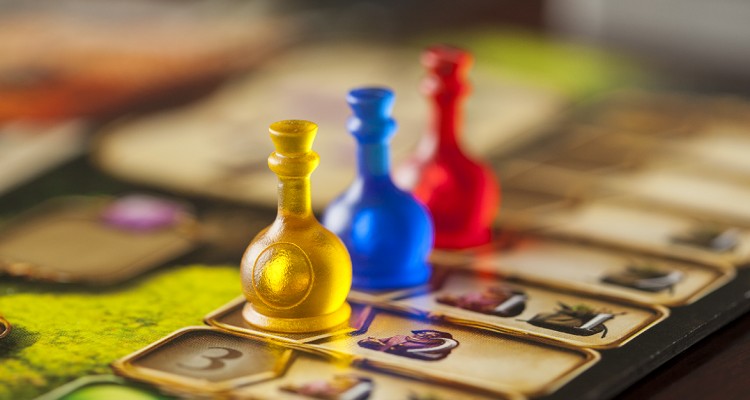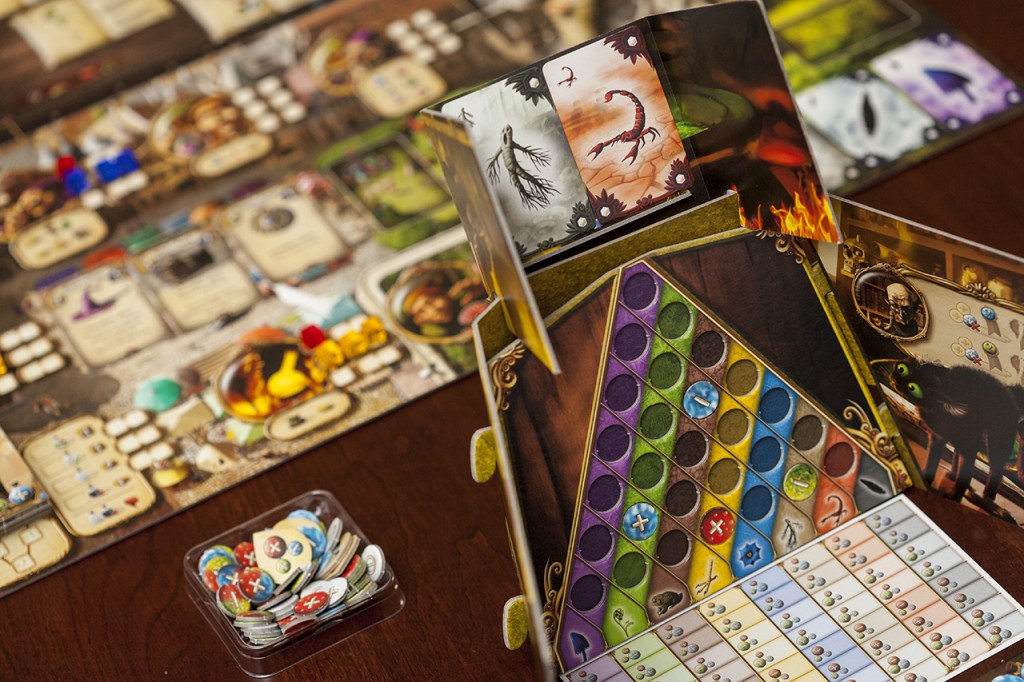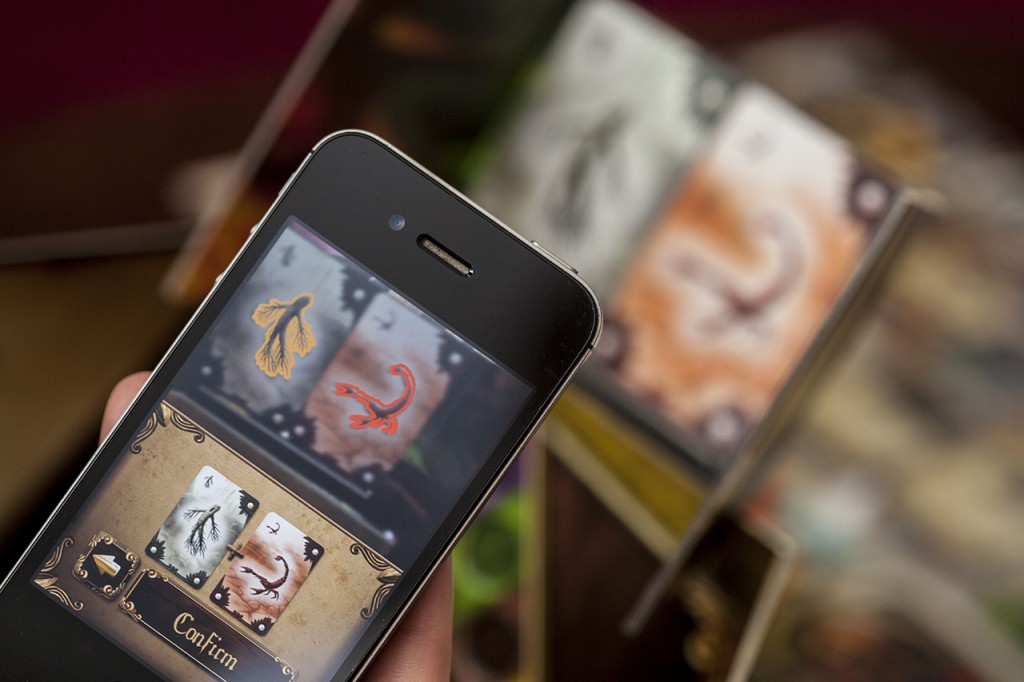Time is of the essence! The ingredients collected today will surely yield the correct results! Admittedly, mixing mandrake and toad was a bit reckless on my part and produced some unintended side effects for my student. I’m certain he would accept apologies and a gold piece to try this new formula. Hmm… my pocket seems to be a bit light today… I must have spent the last of it on this new cauldron and Magic Mortar. Maybe there is a brave hero in town, with fresh coin in his pocket, who would commission one of my concoctions…? Alas, there is no time! I need to publish these results today for the convention. Well, bottoms up…
Here, drink this…
Alchemists, by designer Matúš Kotry and publisher Czech Games Edition, is a hefty 2-4 player deduction game that oozes theme and cleverness. The goal of the game is to determine which alchemical attribute pairs with each ingredient type and then “publish” those findings in order to gain reputation (victory points). You do this by first collecting different ingredient cards and then, using a custom smartphone app, secretly mixing the ingredients to see what concoctions they make. Using logic and the handy player board given to you, gathering and mixing different ingredients will help you deduce the attributes of each ingredient. Using this information, you can eventually publish your results for gold and reputation, debunk other players findings, and sell your creations to desperate travelers who wander into town.
The game progresses over a scant six rounds, so you’ll need to hurry and keep moving if you ever hope to have your findings published! Player order for each turn is determined through a ‘reverse-bidding’ mechanic, where you can choose to potentially go later in the turn order in return for a selection of free resources, or receive little to nothing and get first shot at the action spaces. An additional benefit of going first is that those lower than you on the track must declare their actions first, allowing you a peek at their plans for the turn. Some action spaces allow you to collect ingredients, others are used to sell potions to travelers or are for publishing theories. Each space has an associated cost, whether it be simply time (in the form of your action cubes) or money. In this way, planning ahead is essential for you to yield any useful results. After all cubes are placed, each action space is resolved in clockwise order, starting with the gathering of ingredients. Individual actions on each space are taken in turn order, as determined by the placement of the cubes. An example of a typical first round involves each player gathering some ingredients, spending a few coins on some artifacts and then shoving a random potion or two down the throats of some brave students just to see what happens; all in the name of science!
Satisfies your “App”etite
The crux of Alchemists is the deduction element that is executed with a custom designed smartphone app that acts as the arbitrator. Each of the different ingredients in the game is randomly assigned an alchemical structure within the app, and it is your job to carefully pair two ingredients at a time, observe what they yield, and reverse engineer their composition. This combination of analog and digital components is really what draws players into this game. By simply sharing the custom generated game-code with the players around the table, no internet required, everyone can access the same randomly generated puzzle. While some may be hesitant to introduce an app as an essential piece of a board game – we use tabletop games to escape our phones for a bit, right? – it proves to integrate seamlessly and not detract from Alchemists as a whole. And for those who still nay-say, there is technically a way to manually develop the puzzle that the app does automatically, but what fun is that?! It’s certainly doable, however, but requires an extra non-playing party to act as a GM for the length of the game.
An additional standout element in Alchemists is the way you can publish, endorse and debunk other players research to gain reputation. It adds in a racing element, as you and your opponents look to be the first to successfully identify the various ingredients. You do this by placing ribbon markers of your color on a separate “publishing board” with a token that indicates your hypothesis for that specific ingredient. These ribbons are placed face down in secret, allowing you to approach publishing from many different angles. Some players like to be the first to publish and grab a grant for some extra money, while others (slackers) just piggy-back on other, smarter players, by endorsing their theories. Others still may go the route of waiting for their opponents to incorrectly publish, so they can debunk that obviously (to them!) incorrect theory for points. Eventually though, you will need to have a ribbon or three on this board, otherwise you will lose reputation at the wizard conventions that occur twice during the game. Academics can be cruel and cutthroat!
The game will come to an end after each wizard shows off their theories in the last round’s grand exhibition; the app will then reveal the correct alignment of the alchemicals contained by each ingredient, allowing you to check the published theories for validity. Players can also turn in any extra cards and coins for additional points. The player with the most fame and reputation is the winner!
It’s all in the mix
Alchemists is such a great game. The theme is one of the most engaging of all the games I have played thus far. It never feels pasted on and it really puts you on the spot of actually conducting experiments. The phone app is very well done and really sends this game over the top in terms of presentation and function. Be warned, though, this game is not for the faint of heart. While the game is very fun, it can end up being a huge time sink, especially on your first play. Alchemists is a huge brain burner and at times can put people into analysis comas. Be sure to take time to really study the rule book or do a solo runthrough. On our first play, we spent a good hour just going over all of the rules since there is so much to sink your teeth into.
Even with its engaging gameplay and seamless app integration, I do have some very minor gripes about the game. First, it can be a struggle to scale the learning curve for some gamers. You must take the time to go over some of the basic fundamentals of the game’s alchemy mechanics, and you should probably do this before going into any rules of the game itself. If a player is just absolutely lost before going past this point, it will be a good indication to put this one away. Once you have the way that the alchemical attributes interact, you can get into the details of a basic round and the available actions. Secondly, the included notepad is just way too tiny, with some of the symbols on the pad being difficult to distinguish at times. Third, the player screens are gigantic. Your neck will start to cramp from ducking in and out from behind your little alchemy cubbyhole to see the board or what your opponents are up to. Still, it is a necessary evil to keep all of your research secret from other players.
Alchemists is one of those games that you just have to get through that first play to see the big picture. Once you get a game or two under your belt, play times dramatically decrease and you can eventually start to do some of the actions simultaneously to speed things up a bit. On my first play, I was so frustratingly stuck on what some of the results were telling me, that I simply could not figure out how to mark up my note sheet. After I was able to decompress and think about it, it all just clicked and my second play was much smoother. In my experience, when teaching the game, I find it easiest to break it down and introduce the new pieces when they come along as the game progresses. After that first game is complete, the room gets much brighter from all of the light bulbs flickering to life over everyone’s head.
[su_custom_gallery source=”media: 12039,12038,12034,12030,12033,12031″ limit=”6″ link=”lightbox” target=”blank” width=”220″ height=”220″ title=”never”]
League Ruling
Kelly
Brain-burner is an understatement. Alchemists is a fantastic puzzle that throws itself on top of a worker placement mechanic. The first time I played this was at Origins, and I may or may not have been completely exhausted and sleep-deprived while Steve was teaching it. I had no idea what the heck he was telling me about red circles and blue circles and whether the green one was big or small and which had a plus sign or a minus sign. Trying to keep track of the combinations you’ve put together and what their results have been is difficult. Probably the hardest part of playing this game is ensuring that you keep track of how the size of the alchemical components and their charges interact so that you can keep track of your ingredients. I will say that there is little that is more satisfying than crossing off all of those alchemicals and having only one left in your ingredient column. This makes the publishing aspect of the game that much better: if you’re right, you get to rub it in everyone else’s befuddled faces. If you’re not right, just pretend and see if anyone endorses you and maybe you can at least score some points or something. Playing Alchemists is a time commitment, especially if you are playing with someone new or it’s been awhile since you played, but it is definitely worth it!
Smee’s Two Pence
Alchemists is the sort of game that I should thrive on, but it seems to fall into the same category as The Manhattan Project in that I love it, but will never, ever, pull off a win while playing. I’m a logical sort of guy, and solving these types of puzzles is what I love, but /something/ will always throw a monkey-wrench into my best-laid plans. Perhaps I’m too engrossed in solving the puzzle to bother scoring the victory points, or staring at my notes and knowing there’s an error somewhere in them, this game tends to drive me crazy. Personally, the smartphone app is the only downside to the game as a whole, but given that it is quite well designed and can still be mitigated if you have an extra body, it doesn’t really hurt my opinion of the title. I can only give Alchemists one thumb due to the hair-pulling nature of it, but I do enjoy the game!
Ben
Alchemists was a pleasant surprise for me. I wasn’t really sure what to expect from it, but from the outside it just looked like another super long and complicated brain-burner that I wanted to avoid. After playing it for the first time at Origins 2015, I was hooked. While it IS a brain-burner, and the first play is definitely a learning experience, it’s a really awesome deduction-style puzzle game that is right up my alley with just the right amount of worker placement mixed in. The moment it all clicks and the combinations finally make sense is great and just made me want to play it again. I bought my own copy right after Origins and have played it many times since. The app works really well for this game, as well, since it allows everyone to take part in the puzzle without needing a “gamemaster” and seems to make it a fluid experience all around. While I typically prefer shorter games, Alchemists is different. It’s long, but you are engaged the entire time and I never notice the time commitment. The only negative I can think of is that I have had games with card draws that give me combinations that aren’t as useful as others. It’s possible to get stuck in situations where you aren’t able to figure out as much of the puzzle as others because of this. Overall though, if you’re looking for a tough deduction game, Alchemists is worthy of a play.
Matt
As my colleagues have emphasized, Alchemists is – appropriately enough – some mad scientist’s cross-mutation of Clue, Mastermind, and Stone Age. Understanding the process of the game, where to place actions cubes and what each space yields, is the easy part. Actually solving the hidden puzzle is an exercise in legitimate chemistry, as you logically narrow down the possibilities for each ingredient by cross-referencing the charges, colors and sizes of their atoms. It is the first and only game that, on my first play, made me feel legitimately stupid. It wasn’t just that I couldn’t find a good strategic way to do what need to be done; I was wholeheartedly unable to understand how things actually worked. Many games later, I’m only slightly better off than I was then. I enjoy its challenge though, at least in retrospect after spending two hours deciding between pulling out my hair or flipping the table. It isn’t for the faint of heart, but it’s definitely a worthwhile endeavor. Just bring something to cry into and hide any degrees or certificates you’ve received from work or college – you may feel the desire to burn them all by the end.











